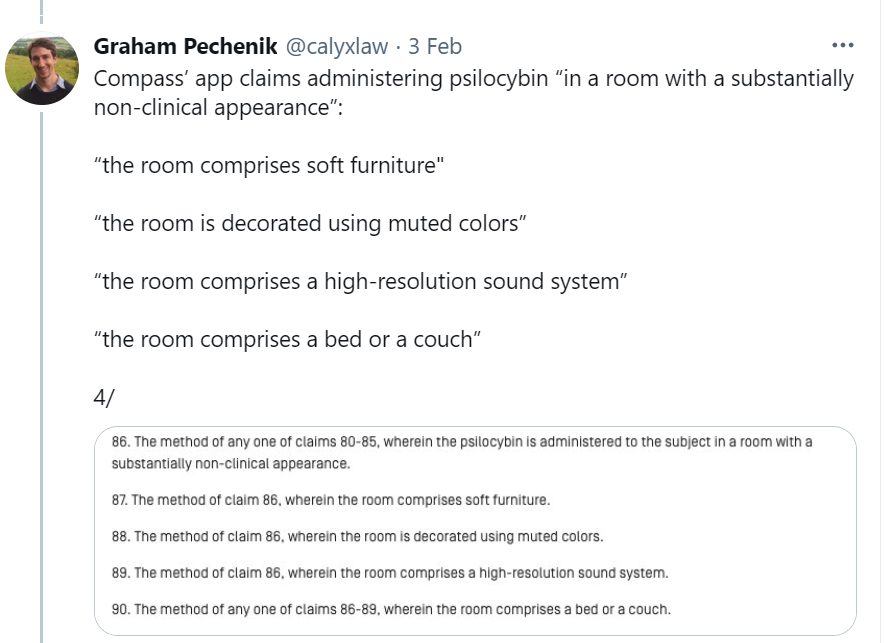Where profit-motives and psychedelics meet
The mental health company Compass Pathways reached the headlines this February for causing controversy over patents related to psychedelic therapy. Patenting gives a company ownership over something, meaning the company can charge others to use it and lawfully sue those using it without permission. In short, patents can equal big money. Hence, mass alarm struck the mental health and psychedelic community when intellectual property lawyer, Graham Pechenik, Tweeted about Compass's peculiar patent claims over fundamental aspects of psychedelic therapy. Such requests included holding hands, high-quality speakers and having a bed or couch in the room.
This hasn't been the first time Compass has raised concerns about their profit motives. In 2017, the company moved from a charitable to a for-profit organisation to attract capital investment, and in 2018 they filed a patent, from which they could profit, over a novel method of synthesising psilocybin, the active ingredient in magic mushrooms. Having tried 27 different times before the patent claim was accepted, the company's drive to have ownership over psilocybin synthesis is transparent. With for-profit companies like Compass patenting ways to manufacture psychedelics, other mental health and psychedelic research groups could face barriers in getting hold of psychedelic compounds. In turn, this could limit psychedelic research, and if and when legal, limit psychedelic therapy access to those who can afford the price tag.
Rick Doblin, the founder of the non-profit organisation multidisciplinary association for psychedelic studies (MAPS) defended the work of Compass in an interview following the announcement of their manufacturing patenting:
"I think Compass is doing incredibly good work in educating mainstream psychiatrists and psychotherapists all over the world about the value of psilocybin. They recently obtained breakthrough therapy designation from the FDA for psilocybin for treatment-resistant depression, and that's really helpful."
Founder of MAPS, Rick Doblin
Doblin raises a fair argument that, despite utilising a for-profit framework, Compass's job of raising awareness of psychedelics' therapeutic promises has an undoubted benefit. We can't deny Compass has demonstrated its mission of accelerating patient access to psilocybin therapy, using its profits to fund psychedelic research studies at King's College London, and supporting organisations like the Depression and Bipolar Alliance and the Aquilino Cancer Center. However, with the recent company's claims to monopolise some of psychedelic therapy's essential aspects, their intentions are seemingly much more questionable. They may be catalysing the process of patient access. But will their effort lead to equal access for all in need of psychedelic therapy? Or limited access only to those who can afford the price tag?
Doblin's apparent views on psychedelic capitalism fit within an established trojan horse argument. That being, through the chassis of a corporate and capitalist framework, psychedelics will become widely acceptable, ending stigmatisation and leading to more people with access to their therapeutic benefits. In essence, the Trojan horse psychedelic capitalism will lead to more good than harm. Yet this is seemingly doubtful.
Depiction of the trojan horse argument for psychedelic capitalism
The intertwining between profit-motives and psychedelics already exist on a small scale. And so far, has highlighted some serious concerns. In countries where the drugs are legal, the hype for psychedelic retreats has created a booming market, meaning accessing these drugs through a legal route can cost an extortionate amount. And often those traumatised, who may benefit most from psychedelic therapy, don't have the resources to fund retreats. The high cost of psychedelic retreats also causes concern over motivations. With high profit at stake, to what degree are retreat centres operating from the wanting to help others and to what degree the wanting for financial gain? Worryingly, we may ask - what corners are being cut to maximise profit? And is essential harm-reduction being threatened as a result? Psychedelics put people in vulnerable states, and traumatisation is very real. The gravity that can result from jeopardising preparation, integration or other harm-reduction steps for cost-related reasons is enormous. With legalised psychedelic health-care in the hands of for-profit companies and money being the main priority instead of public health, what ramifications could people face as a result?
The popularity boost of shamanic-healing, i.e. taking psychedelics with a guide, has also led to a plethora of companies jumping on the bandwagon to make money from shamanic training courses. If you search your web browser, you'll see a whole host of internet deals for various shamanic training, including a notable portion you can even do in the comfort of your own home. Its great people are becoming invested in spiritual wisdom, but holding somebody in such an undefended state, as when on psychedelics, is a high responsibility that should require thorough knowledge and experience. Is completing a bargain-deal internet training sufficient to hold psychedelic space? Worryingly, we should also question the driving forces behind people taking shamanic and psychedelic healing courses. Self-acclaimed shamans seeking only profit without genuine care for the people they are guiding are significant threats. How can we ensure they aren't only seeking profit without genuine care of the person they are guiding?
The plethora of “high-quality affordable” online courses to register as a shaman
In the context of psychedelic mainstreaming, on a scaled clinic level, psychedelics therapists should hold the same level of integrity and experience as any psychedelic guru or shaman—especially when working with people already vulnerable due to mental and physical health conditions. Compass has been criticised that its psilocybin-therapy training is not thorough enough, accepting therapists with no personal experience of the drug and requiring a limited five-day only in-person training. The psychedelic experience is so unique and ineffable, it is difficult to grasp without first-hand experience. Understanding the journey in which a patient makes during a psychedelic experience certainly seems like something worthwhile for a therapist. Having entered a psychedelic space, therapists would be better suited to empathise with patients, and more guide patients through any difficulties during the psychedelic experience. Yet for Compass, they seemingly see this added experience redundant. One could argue that this is an effort to increase the number of trained professionals, so when legalised, psilocybin therapy is more available. However, one could also say that this is simply an example of rolling back costs.
Compass is undoubtedly not alone in its corporate interest in psychedelics. Psychedelic investment has been likened to a "gold-mine", and for-profit companies looking for domination in the field continue to emerge. In April 2020, the Candian company Mindmed signed an agreement with the Liechti Lab, a leading psychedelic research group based in Switzerland, giving them rights to any patents generated by data or findings generated by their psilocybin research. Big investments names are joining the market, including Peter Theil, co-founder of PayPal, and even the clothing business Hollister. It is unnerving that the psychedelic industry could be controlled by those with an agenda for business and not improving healthcare and wellbeing. Care and support for all aspects of psychedelic use, whether medical or recreational, should be top priority and not compromised by any means for financial gain. Yet, with increasing investment, corporate domination of the industry is a significant threat.
The multi-state company Hollister, who made significant investment into the Cannabis Industry as Hollister Cannabis Co and are now moving into the psychedelic market as Hollister Biosciences, Inc
It's challenging to know what the future of psychedelic capitalism will hold. In the US, the decriminalisation of cannabis for medical treatment has fuelled a market predicted to reach an astonishing $26 billion by the end of 2026. With increasing evidence for psychedelics' therapeutic uses and a growing push for decriminalisation, is it inevitable the psychedelic market will follow in the same trajectory as cannabis? Like with cannabis and pharmaceuticals, it's very possible psychedelics could surface as yet another profitable medicine dominated by an appetite for power and money. A phenomenon the mycologist Darren Springer described in a recent webinar as:
"Same shit, different toilet."
Nonetheless, nonprofits such as MAPS, Usona and the Beckley Foundation provide hope for a less corporatised psychedelic industry future. For example, Usona has openly shared many different ways to manufacture psilocybin, supporting open science and battling Compass's attempt to dominate psilocybin research. In an effort to ensure the integrity of start-ups in the field, the nonprofit North Star has created a pledge for psychedelic stakeholders to follow ethical guidelines. And as the number and power of psychedelic businesses grow, simultaneously, charitable organisations and public benefit corporations do also.
Psychedelic capitalism may be a method to decrease the stigma and take these drugs into mainstream healthcare. But it is not the only way psychedelics will be made available, and the potential for harm in bringing them forward down this route is evident. Is it worth speeding up the process of psychedelic healthcare for the drugs to be largely unavailable to those who can't afford it? Or to have harm-reduction ignored in the face of trying to sell products?
We might not be able to stop psychedelic capitalism. However, we can support nonprofits in their growth, ensuring we continue to have leaders in the psychedelic field whose interest lies within public health, not finances. We can also raise our voice and concern about corporatisation's dangers, the problems we have already seen emerge, and problems we could predict with psychedelic mainstreaming upscaled. And as more psychedelic courses, retreats and products appear, we must continue to protect users by disseminating important information regarding psychedelic safety.
Luckily, Compass's claims don't appear to have been accepted. So at least for now, we can settle in the knowledge that companies, charities and institutions, for-profit or not, can freely use a bed and some half-decent speakers in their psilocybin-therapy sessions. But let's not just keep this backlash against Compass as another social media outrage, which disappears once a new internet headline hits. Instead, let's use this as an opportunity to raise a concern and call action to reconcile the power corporations will have in psychedelic mainstreaming. In light of our psychedelic revolution, let's push for the revolution we want to see. Not just a different toilet.




